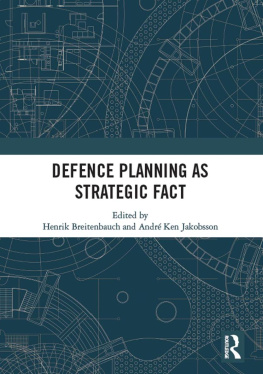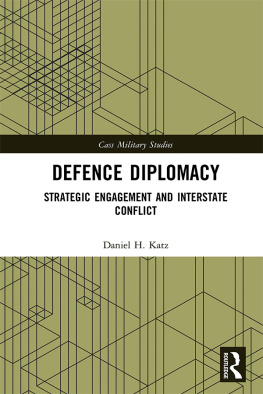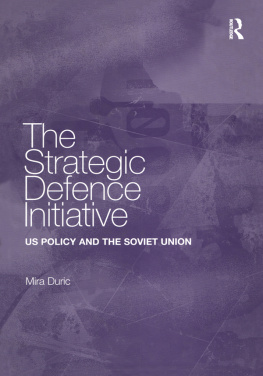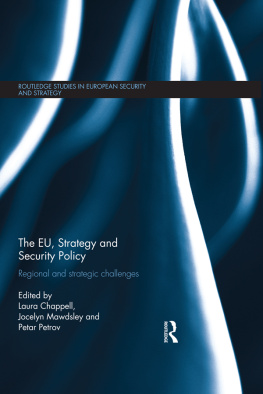Defence Planning as Strategic Fact
Defence Planning as Strategic Fact provides and elaborates on an upstream focus on the variegated organizational, political and conceptual practices of military, civilian administrative and political leaderships involved in defence planning, offering an important security and strategic studies supplement to the traditional downstream focus on the use of force.
The book enables the reader to engage with the role of ideas in defence planning, of organizational processes and biases, path dependencies and administrative dynamics under the pressures of continuously changing domestic and international constraints. The chapters show how defence planning must be seen as a constitutive element of defence and strategic studies that it is a strategic fact of its own which merits particular practical and scholarly attention.
As defence planning creates the conditions behind every peace upheld or broken and every war won or lost, Defence Planning as Strategic Fact will be of great use to scholars of defence studies, strategic studies, and military studies.
This book was originally published as a special issue of Defence Studies.
Henrik Breitenbauch heads the Centre for Military Studies in the Department of Political Science at the University of Copenhagen, Denmark. The Centre advises Denmarks parliament and government on strategy, defence and security issues.
Andr Ken Jakobsson is a Carlsberg Postdoctoral Fellow at the Centre for Military Studies in the Department of Political Science at the University of Copenhagen, Denmark, with a project on grey zone conflicts and great power politics.
Defence Planning as Strategic Fact
Edited by
Henrik Breitenbauch and Andr Ken Jakobsson
First published 2020
by Routledge
2 Park Square, Milton Park, Abingdon, Oxon, OX14 4RN
and by Routledge
52 Vanderbilt Avenue, New York, NY 10017
Routledge is an imprint of the Taylor & Francis Group, an informa business
Chapters 17, Conclusion 2020 Taylor & Francis
Introduction 2018 Henrik Breitenbauch and Andr Ken Jakobsson. Originally published as Open Access.
With the exception of the Introduction, no part of this book may be reprinted or reproduced or utilised in any form or by any electronic, mechanical, or other means, now known or hereafter invented, including photocopying and recording, or in any information storage or retrieval system, without permission in writing from the publishers. For details on the rights for the Introduction, please see the chapters Open Access footnote.
Trademark notice: Product or corporate names may be trademarks or registered trademarks, and are used only for identification and explanation without intent to infringe.
British Library Cataloguing-in-Publication Data
A catalogue record for this book is available from the British Library
ISBN13: 978-0-367-41723-9
Typeset in Minion Pro
by codeMantra
Publishers Note
The publisher accepts responsibility for any inconsistencies that may have arisen during the conversion of this book from journal articles to book chapters, namely the inclusion of journal terminology.
Disclaimer
Every effort has been made to contact copyright holders for their permission to reprint material in this book. The publishers would be grateful to hear from any copyright holder who is not here acknowledged and will undertake to rectify any errors or omissions in future editions of this book.
Contents
Henrik Breitenbauch and Andr Ken Jakobsson
Magnus Christiansson
Jordan Tama
Benjamin M. Jensen
Jan Angstrom
Alexander Mattelaer
Thomas-Durell Young
Paul K. Davis
Henrik Breitenbauch and Andr Ken Jakobsson
The chapters in this book were originally published in Defence Studies, volume 18, issue 3 (September 2018). When citing this material, please use the original page numbering for each article, as follows:
Defence planning as strategic fact: introduction
Henrik Breitenbauch and Andr Ken Jakobs
Defence Studies, volume 18, issue 3 (September 2018) pp. 253261
Defense planning beyond rationalism: the third offset strategy as a case of metagovernance
Magnus Christiansson
Defence Studies, volume 18, issue 3 (September 2018) pp. 262278
Tradeoffs in defense strategic planning: lessons from the U.S. Quadrennial Defense Review
Jordan Tama
Defence Studies, volume 18, issue 3 (September 2018) pp. 279301
The role of ideas in defense planning: revisiting the revolution in military affairs
Benjamin M. Jensen
Defence Studies, volume 18, issue 3 (September 2018) pp. 302317
The US perspective on future war: why the US relies upon Ares rather than Athena
Jan Angstrom
Defence Studies, volume 18, issue 3 (September 2018) pp. 318338
Rediscovering geography in NATO defence planning
Alexander Mattelaer
Defence Studies, volume 18, issue 3 (September 2018) pp. 339356
Questioning the Sanctity of long-term defense planning as practiced in Central and Eastern Europe
Thomas-Durell Young
Defence Studies, volume 18, issue 3 (September 2018) pp. 357373
Defense planning when major changes are needed
Paul K. Davis
Defence Studies, volume 18, issue 3 (September 2018) pp. 374390
Coda: exploring defence planning in future research
Henrik Breitenbauch and Andr Ken Jakobsson
Defence Studies, volume 18, issue 3 (September 2018) pp. 391394
For any permission-related enquiries please visit:
http://www.tandfonline.com/page/help/permissions
Jan Angstrom is a Professor of War Studies at the Swedish Defence University, Sweden, and an Associate Professor in the Department of Peace and Conflict Research at Uppsala University, Sweden.
Henrik Breitenbauch heads the Centre for Military Studies in the Department of Political Science at the University of Copenhagen, Denmark. The Centre advises Denmarks parliament and government on strategy, defence and security issues.
Magnus Christiansson is a PhD Candidate at the University of Stockholm, Sweden. As a Lecturer, he teaches strategic studies, Baltic Sea security, deterrence theory and risk theory.
Paul K. Davis is a Retired Adjunct Senior Principal Researcher at RAND, USA, and a Professor of Policy Analysis in the Pardee RAND Graduate School.
Andr Ken Jakobsson is a Carlsberg Postdoctoral Fellow at the Centre for Military Studies in the Department of Political Science at the University of Copenhagen, Denmark, with a project on grey zone conflicts and great power politics.
Benjamin M. Jensen holds a dual appointment as a Professor of Strategic Studies at Marine Corps University, USA, and as a Scholar-in-Residence in the School of International Service at the American University, Washington, D.C., USA. He is also a Senior Non-Resident Fellow at the Atlantic Council, USA and an officer in the U.S. Army Reserves, 75th Innovation Command.














